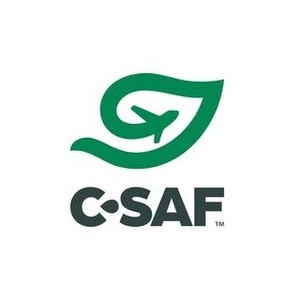Canadian Council for Sustainable Aviation Fuels launches

February 24, 2022
BY Canadian Council for Sustainable Aviation Fuels
Canadian aviation industry leaders are joining forces to create the Canadian Council for Sustainable Aviation Fuels (C-SAF), whose mission is to accelerate the deployment of sustainable aviation fuels (SAF) in Canada to ensure that the Canadian aviation sector remains competitive as it transitions to a net-zero future.
Sustainable aviation fuels can reduce greenhouse gas emissions by up to 80 percent and can be used now without significant modifications to aircraft or supply infrastructure. Their use will allow for rapid results in achieving carbon neutrality in the sector.
Created by a consortium of 60 airlines operating in Canada and comprised of key stakeholders in the Canadian aviation ecosystem including suppliers, aerospace manufacturers, airports, finance, and academia, the Council will aim to facilitate the production and supply of affordable, low-carbon, made-in-Canada SAF. The C-SAF will also act as the voice of its members with governments and stakeholders to develop an ambitious strategy and roadmap for a profitable and sustainable SAF market in Canada.
"Decarbonizing Canadian aviation requires collaboration between industry, governments, scientists and airlines. The C-SAF provides a space for a common dialogue to facilitate the exchange of ideas to reduce GHG emissions from aviation and we strongly believe that with everyone working together, change can happen faster," said Geoff Tauvette, executive director of the C-SAF.
Decarbonizing Canadian aviation
The aviation sector will be one of the most difficult to decarbonize as electric and hydrogen technologies are in development and will not easily be used until sometime in the future. Thus, it is essential to put in place a set of coherent public policies that will encourage the establishment of a sustainable aviation fuel value chain to accelerate their commercialization and widespread use.
Advertisement
Advertisement
"The aviation industry is in constant evolution to ensure a greener future for our planet. With the launch of the Canadian Council for Sustainable Aviation Fuels, Canada's aviation sector will remain competitive and will create jobs for Canadians while reducing pollution. This initiative will help in Canada's goal in achieving net-zero emissions by 2050 and is a step in the right direction for the aviation industry," mentioned the Minister of Transport, the Honourable Omar Alghabra.
"We want to promote and implement sound public policies to address aviation's need for a sustainable, made-in-Canada, affordable supply of aviation fuel. I salute the vision of the industry players and thank all of our partners who will enable Canada to become a leader in the decarbonization of global aviation," concluded Geoff Tauvette.
In summary
•C-SAF is a not-for-profit organization that brings together all players in the aerospace chain to facilitate the production and supply of affordable, low-carbon, Canadian-made sustainable aviation fuels (SAF).
•Sustainable aviation fuels can reduce life-cycle carbon emissions by up to 80 percent compared to traditional jet fuel.
Advertisement
Advertisement
•Sustainable aviation fuels are produced from renewable feedstocks that are widely available in Canada, such as forest and agricultural residues, industrial fats, oils and grease, municipal solid wastes and CO2 captured from industrial processes or the air.
•Canada has all the ingredients to create an affordable and reliable SAF market: an abundance of renewable feedstocks, low-carbon energy sources, climate policies and evolving carbon pricing.
•Currently, sustainable aviation fuels can cost up to 8 times more than traditional jet fuel and are not produced or imported in significant quantities into Canada.
Related Stories
Broco Energy on July 17 announced a new partnership with the Massachusetts Port Authority (Massport) to deliver and transition Massport's fuel tanks to renewable diesel across its various facilities.
Shell Aviation, Accenture, and Amex GBT on July 10 announced Avelia is in the process of evolving to an industry solution with independent data hosting and a multi-supplier model helping users access the GHG benefits of SAF.
The U.S EPA on July 17 released data showing more than 1.9 billion RINs were generated under the RFS during June, down 11% when compared to the same month of last year. Total RIN generation for the first half of 2025 reached 11.17 billion.
The U.S. EPA on July 17 published updated small refinery exemption (SRE) data, reporting that six new SRE petitions have been filed under the RFS during the past month. A total of 195 SRE petitions are now pending.
European biodiesel producer Greenergy on July 10 confirmed plans to shut down its biodiesel plant in Immingham, Lincolnshire, U.K. The company temporarily suspended operations at the facility earlier this year.
Upcoming Events










